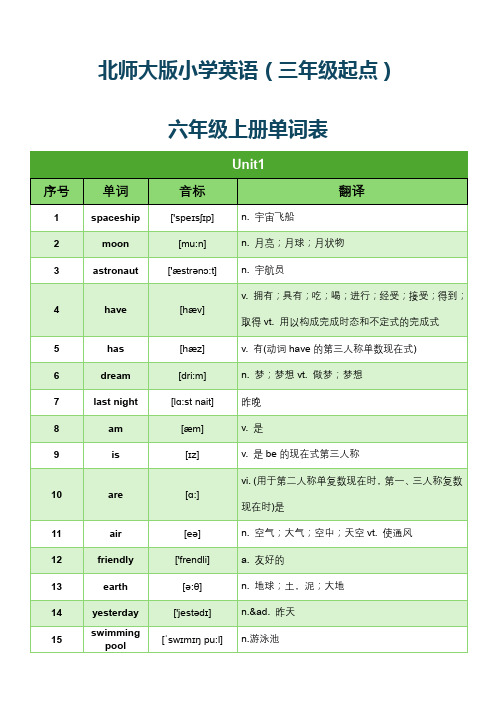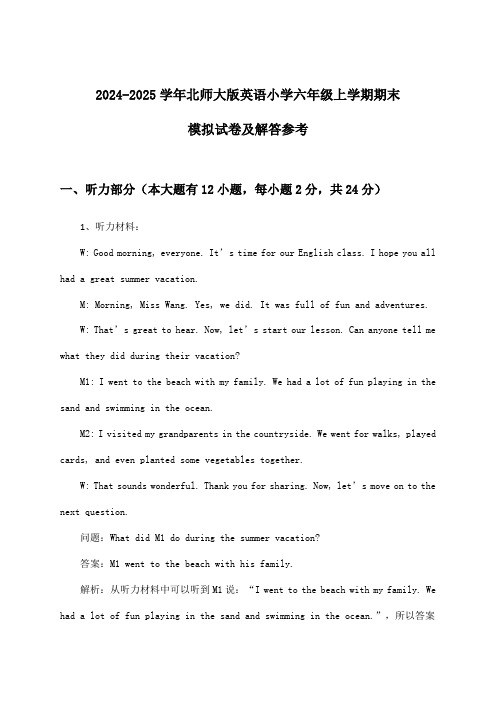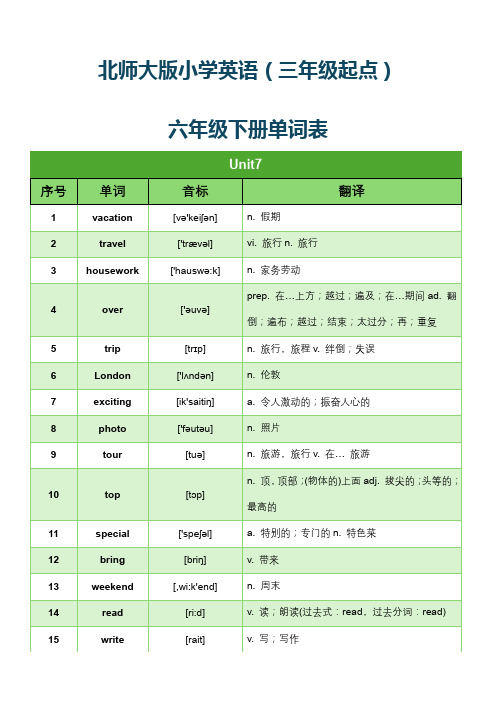北师大版小学英语英语六年级
北师大版小学英语(三年级起点)六年级上册单词表(分单元含音标)

slowly
['sləuli]
adv.慢慢地;缓慢地
6
want
[wɒnt]
vt.想,想要;需要,必要
7
pass
[pɑ:s]
vt.传,递;经过;通过;超过n.通行证;关隘
8
eat
[i:t]
v.吃(过去式ate)
9
quickly
['kwikli]
adv.快地;迅速地
10
another
[ə'nʌðə(r)]
18
seventh
[ˈsevnθ]
n.第七(个);七分之一;[乐]七度音程;adj.第七的;七分之一的;adv.居第七位地
19
eighth
[eɪtθ]
num.第八
20
ninth
[naɪnθ]
num./adj.第九;九分之一n.第九(个);(月的)第九日adv.第九
Unit4
序号
单词
音标
翻译
1
birthday
3
centimeter
['sentɪˌmi:tə]
n.厘米
4
weigh
[wei]
vt.称…的重量
5
kilogram
['kɪləɡræm]
n. (kg)千克
6
take
[teɪk]
vt.拿;拿走;做;服用;乘坐;花费(过去式took)n.连续拍摄的场景、镜头
7
center
['sentə]
n.中心,中央
8
11
air
[eə]
n.空气;大气;空中;天空vt.使通风
12
friendly
2024-2025学年北师大版小学六年级英语上册期末考试试题及答案

2024-2025学年北师大版小学六年级英语上册期末考试试题班级:________________ 学号:________________ 姓名:______________一、听力题(每题3分)Question 1:Listen to the dialogue and choose the correct answer.A: Good morning, what time is it?B: It’s eight o’clock.Which time is it?A. Seven o’clock.B. Eight o’clock.C. Nine o’clock.Answer: BQuestion 2:Listen to the short passage and answer the question.(Passage: John is going to the zoo with his family this weekend. They are going to see the lions, tigers, and elephants.)What are they going to do this weekend?A. They are going to the cinema.B. They are going to the zoo.C. They are going to visit friends.Answer: BQuestion 3:Listen to the words and choose the correct spelling. (Pronunciation of “library” is given)A. labaryB. libaryC. libraryAnswer: CQuestion 4:Listen to the instructions and circle the correct picture. (Instructions: Draw a circle around the picture of a cat.) (Options: Picture of a dog, cat, and rabbit)Answer: (Circle the picture of a cat)Question 5:Listen to the teacher’s question and choose the best response. (Teacher’s question: “What’s your favorite subject, Tom?”) A: My favorite subject is science.B: I like playing football.C: I have lunch at school.Answer: A二、单选题(每题3分)1.— What’s your favorite subject?_________.A. I like English.B. My favorite subject is math.C. I have English and math.Answer: B2.—_________do you go to the zoo?Twice a year.A. How oftenB. How manyC. How longAnswer: A3.The_________month of the year is February.A. secondB. firstC. twelfthAnswer: A4.She often_________her homework after dinner.A. doesB. doC. doingAnswer: A5.There_________a lot of books in the library.A. isB. areC. beAnswer: B三、多选题(每题4分)Question 1: Which of the following are ways to greet someone? (Select two.)A. Hello, how are you?B. I’m sorry.C. Good morning.D. Goodbye.Answer: A, CQuestion 2: Which of these sentences are correct? (Select two.)A. He like to play football.B. She d oesn’t likes apples.C. They are going to the park.D. Does he have a pencil?Answer: C, DQuestion 3: Choose the two correct subjects for the following verbs: The verbs are: play, watchA. TVB. pianoC. bookD. footballAnswer: A, D (Watch TV, Play football)Question 4: Which of the following are the names of fruits? (Select two.)A. AppleB. CatC. BananaD. ChairAnswer: A, CQuestion 5: Identify the two school subjects mentioned in the following sentences:A. I like to read stories in English.B. I enjoy drawing pictures.C. My favorite sport is basketball.D. I love listening to music.Answer: A, B (English, Drawing)四、阅读理解(每题4分)Reading ComprehensionPassage:It was a sunny day. Lily and Lucy were walking in the park. They saw a sign that said, “Lost Dog!” The sign had a picture of a cute little dog on it. The dog’s name was Max, and he was lost in the park. Lily and Lucy decided to help find Max.They looked around the park for a while, but they didn’t see the dog. Then they saw a little boy crying in the corner. They asked the boy if he was okay. The boy said, “I’m looking for my dog, Max. He’s lost.” Lily and Lucy told the boy that they were also looking for Max.The three of them searched together. After a while, they heard a barking sound coming from a bush. They ran over and found Max hiding there. The boy was very happy to see his dog again. He thanked Lily and Lucy for helping him.Questions:1.What was the weather like on that day? (4 points)Answer: It was a sunny day.2.Who did Lily and Lucy see on the sign? (4 points)Answer: They saw a picture of a cute little dog named Max.3.Why were Lily and Lucy looking for Max? (4 points)Answer: They wanted to help find Max because he was lost in the park.4.Who did Lily and Lucy meet in the park? (4 points)Answer: They met a little boy who was crying and looking for his dog, Max.5.Where did they finally find Max? (4 points)Answer: They found Max hiding in a bush.五、作文(30分)Title: My Favorite AnimalInstructions:Write a short essay about your favorite animal. Describe its appearance, habits, and why you like it. Use at least 50 words.Example:My favorite animal is the panda. It has black and white fur, which makes it look very cute. Pandas love to eat bamboo and spend most of their time eating and sleeping. I like pandas because they are endangered, and we need to protect them. They are also a symbol of peace and friendship. Every timeI see a panda, it brings me joy and reminds me to cherish nature.Now it’s your t urn to write about your favorite animal. Remember to describe its appearance, habits, and the reasons why you like it.。
最新北师大版小学英语六年级知识点总结

总结卷子Unit5电脑词汇:keyboard 键盘screen 屏幕CD 光盘mouse 鼠标hard disk 硬盘disk 盘speakers 音响printer 打印机感官词汇:tried累happy开心sad伤心scared害怕hungry饿hot热cold冷bored无聊angry生气worried担心重点句型:What’s wrong with you? What’s the matter with you? 你怎么了。
I need your advice. 我需要你的建议。
What should I do? You should…What should we do? You should…What should you do? I should….What should she/he/they do? She/He/They should…should + 动词原形Unit4服饰词汇:clothes衣服glove 手套jeans牛仔裤pants裤子sweatpants宽松的运动裤T-shirt T恤shoes鞋belt皮带coat 大衣sunglasses太阳镜cap便帽hat礼帽shorts短裤skirt短裙shirt衬衫dress连衣裙sweater毛衣this belt这条皮带that belt 那条皮带these belts 这些皮带those belts那些皮带重点句型:How much does the T-shirt cost? 这件T恤值多少钱?It costs ¥10.How much do the gloves cost? 这些手套值多少钱?They cost $20.sunglasses 复数 a pair of sunglasses 一副眼镜单数Which belt do you prefer?你更喜欢哪条皮带?I prefer this belt. 我们更喜欢这条皮带。
北师大版英语小学六年级上学期期末试卷及解答参考(2024-2025学年)

2024-2025学年北师大版英语小学六年级上学期期末模拟试卷及解答参考一、听力部分(本大题有12小题,每小题2分,共24分)1、听力材料:W: Good morning, everyone. It’s time for our English class. I hope you all had a great summer vacation.M: Morning, Miss Wang. Yes, we did. It was full of fun and adventures.W: That’s great to hear. Now, let’s start our lesson. Can anyone tell me what they did during their vacation?M1: I went to the beach with my family. We had a lot of fun playing in the sand and swimming in the ocean.M2: I visited my grandparents in the countryside. We went for walks, played cards, and even planted some vegetables together.W: That sounds wonderful. Thank you for sharing. Now, let’s move on to the next question.问题:What did M1 do during the summer vacation?答案:M1 went to the beach with his family.解析:从听力材料中可以听到M1说:“I went to the beach with my family. We had a lot of fun playing in the sand and swimming in the ocean.”,所以答案是M1 went to the beach with his family.2、听力材料:W: Hello, everyone. Today, we are going to talk about our favorite subjects in school. What’s your favorite subject, and why?M: My favorite subject is math. I like solving problems and finding patterns. It’s challenging but also fun.M2: I love science. It’s fascinating to learn about how things work and how the world around us is connected.W: Those are interesting choices. I also enjoy reading. There’s so much to discover in books.问题:What is M2’s favorite subject?答案:M2’s favorite subject is science.解析:从听力材料中可以听到M2说:“I love science. It’s fascinating to learn about how things work and how the world around us is connected.”,所以答案是M2’s favorite subject is science.3、 Listen and choose. (听录音,选择相应的图片。
北师大版三年级起点小学英语六年级上(英语单词表)

北师大版三年级起点小学英语六年级上(英语单词表,带发音)Unit 1spaceship英音 [ˈspeɪsʃɪp]美音 [ˈspeɪsʃɪp]n. [航] 宇宙飞船moon英音 [muːn]美音 [muːn]n. 月亮;月球;月光;卫星 vi. 闲荡;出神 vt.虚度astronaut英音 [ˈæstrənɔːt]美音 [ˈæstrənɔːt]n. 宇航员,航天员;太空旅行者have英音 [həv]美音 [həv; əv; hæv]aux. 已经 vt. 有;让;拿;从事;允许has英音 [həz]美音 [həz; əz; hæz]v. 有,吃,得到,从事,允许,雇用,享有(have的第三人称单数);(亲属关系中)…had英音 [həd; əd; hæd]美音 [həd; əd; hæd]v. 有;吃;得到(动词have的过去式和过去分词) aux. 已经(用于过去完成时和过去完成…dream英音 [driːm]美音 [driːm]n. 梦想,愿望;梦 adj. 梦的;理想的;不切实际的 vt. 梦想;做梦;想到 vi. 梦想;做梦…last night na. 昨晚;最后一夜am英音 [əm; æm]美音 [əm; æm]abbr. 调幅 v. 是is英音 [ɪz]美音 [ɪz]v. 是(be的三单形式) n. 存在was英音 [wəz; wɒz]美音 [wəz; wʌz]be的第一和第三人称单数过去式are 英音 [ɑ:(r)]美音 [ər; ɑːr; er]v. 是(be的第二人称单复数现在式) n. 公亩were英音 [wə(r); wɜː(r)]美音 [wər; wɜːr]v. 是,在(are的过去式)Unit 2air 英音 [e ə(r)]美音 [er]n. 空气,大气;天空;样子;曲调 vt. 使通晾夸耀通friendly英音 [ˈfrendli]美音 [ˈfrendli]adj. 友好的;亲切的;支持的;融洽的,和睦的 adv. 友善地;温和地Earth 英音 [ɜːθ]美音 [ɜːrθ]n. 地球;地表,陆地;土地,土壤;尘事,俗事;兽穴 vt. 把(电线)[电] 接地;盖…yesterday 英音 [ˈjest əde ɪ]美音 [ˈjest ərde ɪ; ˈjest ərdi]n. 昨天;往昔 adv. 昨天swimming pool 英音 [ˈsw ɪm ɪŋ pu ːl]美音 [ˈsw ɪm ɪŋ pu ːl]n. 游泳池;游泳场;游泳馆clean英音 [kli ːn]美音 [kli ːn]n. 打扫 adj. 清洁的,干净的;清白的 vt. 使干净 vi. 打扫,清扫 adv. 完全地cleaned英音 [kli ːnd]美音 [kli ːnd]v. 打扫(clean的过去式);把…弄干净 adj.净化的film英音 [f ɪlm]美音 [f ɪlm]n. 电影;薄膜;胶卷;轻烟 vt. 在…上覆以薄膜;把…拍成电影 vi. 摄制电影;生薄膜;变…visit英音 [ˈv ɪz ɪt]美音 [ˈv ɪz ɪt]n. 访问;参观;逗留 vt. 访问;参观;视察 vi.访问;暂住;闲谈visited英音 ['v ɪz ɪt ɪd]美音 [ˈv ɪz ɪt ɪd]v. 拜访,访问(visit的过去式)go英音 [ɡəʊ]美音 [ɡo ʊ]n. 去;进行;尝试 vi. 走;达到;运转;趋于vt. 忍受;出产;以…打赌 [复数 goes 第三…went英音 [went]美音 [went]v. 去,过去(go的过去式)slowly英音 [ˈsl əʊli]美音 [ˈslo ʊli]adv. 缓慢地,慢慢地want英音 [w ɒnt]美音 [wɑːnt]n. 需要;缺乏;贫困;必需品 vt. 需要;希望;应该;缺少 vi. 需要;缺少wanted英音 [ˈwɒntɪd]美音 [ˈwɑːntɪd]v. 缺少( want的过去式和过去分词 );应该;打算;需要…在场 adj. 受通缉的;被征求的pass英音 [pɑːs]美音 [pæs]n. 及格;经过;护照;途径;传球 vt. 通过;经过;传递 vi. 经过;传递;变化;终止passed英音 [pɑːst]美音 [pæst]v. 通过;传递(pass的过去分词);超过 adj.已经通过的;已经过去的;已被传递的eat英音 [iːt]美音 [iːt]vt. 吃,喝;腐蚀;烦扰 vi. 进食;腐蚀,侵蚀ate英音 [et; eɪt]美音 [eɪt]v. 吃(eat的过去式)quickly英音 [ˈkwɪkli]美音 [ˈkwɪkli]adv. 迅速地;很快地another英音 [əˈnʌðə(r)]美音 [əˈnʌðər]prep. 另一个;另一个人 adj. 又一,另一;另外的;不同的 pron. 另一个;又一个suddenly英音 [ˈsʌd(ə)nli]美音 [ˈsʌdənli]adv. 突然地;忽然look英音 [lʊk]美音 [lʊk]vt. 看;期待;注意;面向;看上去像 vi. 看;看起来;注意;面向 n. 看;样子;面容looked英音 [lʊkt]美音 [lʊkt]v. 看,瞧( look的过去式和过去分词 );注意;面向;寻找sick英音 [sɪk]美音 [sɪk]adj. 厌恶的;病态的;不舒服;渴望的;恶心的 ;生病的 n. 病人 vt. 使狗去咬;呕吐;追…cough英音 [kɒf]美音 [kɔːf]n. 咳嗽,咳嗽声;咳嗽病 vt. 咳出 vi. 咳嗽coughed英音 [kɒf]美音 [kɔːf]v. 咳嗽( cough的过去式和过去分词 ); (从喉咙或肺中)咳出; (突然)发出刺耳的噪音everywhere英音 [ˈevriweə(r)]美音 [ˈevriwer]n. 每个地方 adv. 到处help 英音 [help]美音 [help]n. 帮助;补救办法;帮忙者;有益的东西 vt.帮助;促进;治疗;补救 vi. 帮助;有用;招…helped 英音 [helpt]v. 帮助(help的过去分词)Unit 3美音 [helpt]careful英音 [ˈkeəf(ə)l]美音 [ˈkerfl]adj. 仔细的,小心的first英音 [fɜːst]美音 [fɜːrst]num. 第一 n. 第一;开始;冠军 adj. 第一的;基本的;最早的 adv. 第一;首先;优…second英音 [ˈsekənd]美音 [ˈsekənd; sɪˈkɑːnd]num. 第二 n. 秒;第二名;瞬间;二等品 adj.第二的;次要的;附加的 vt. 支持 adv. 第二…third英音 [θɜːd]美音 [θɜːrd]num. 第三;三分之一 adj. 第三的;三分之一的fourth英音 [fɔːθ]美音 [fɔːrθ]num. 第四 n. 第四,月的第四日;四分之一adj. 第四的,第四个的;四分之一的fifth英音 [fɪfθ]美音 [fɪfθ]num. 第五 n. 第五;五分之一 adj. 第五的;五分之一的run英音 [rʌn]美音 [rʌn]n. 奔跑;赛跑;趋向;奔跑的路程 vt. 管理,经营;运行;参赛 vi. 经营;奔跑;运转ran 英音 [ræn]美音 [ræn]v. 跑(run的过去式)race英音 [reɪs]美音 [reɪs]n. 属,种;种族,人种;家庭,门第 vt. 使参加比赛;和…竞赛;使急走,使全速行进 vi. …meter英音 [ˈmiːtə(r)]美音 [ˈmiːtər]n. 米;仪表;[计量] 公尺;韵律 vt. 用仪表测量 vi. 用表计量win英音 [wɪn]美音 [wɪn]n. 赢;胜利 vt. 赢得;在…中获胜;劝诱 vi.赢;获胜;成功won英音 [wʌn]美音 [wʌn]vt. 赢得(win的过去式和过去分词)excited英音 [ɪkˈsaɪtɪd]美音 [ɪkˈsaɪtɪd]v. 激动;唤起(excite的过去分词) adj. 兴奋的;激动的;活跃的Unit 4last 英音 [lɑːst]美音 [læst]n. 末尾,最后;上个;鞋楦(做鞋的模型)adj 最后的;最近的最新的;仅剩的;最prize 英音 [pra ɪz]美音 [pra ɪz]n. 奖品;奖赏;战利品 adj. 获奖的 vt. 珍视;捕获;估价sad 英音 [sæd]美音 [sæd]adj. 难过的;悲哀的,令人悲痛的;凄惨的,阴郁的(形容颜色)decide 英音 [d ɪˈsa ɪd]美音 [d ɪˈsa ɪd]vi. 决定,下决心 vt. 决定;解决;判决decided 英音 [d ɪˈsa ɪd ɪd]美音 [d ɪˈsa ɪd ɪd]vt. 决定(decide的过去式) adj. 明确的;显然的;坚决的,果断的high 英音 [ha ɪ]美音 [ha ɪ]n. 高水平;天空;由麻醉品引起的快感;高压地带 adj. 高的;高级的;崇高的;高音调的…happy 英音 [ˈhæpi]美音 [ˈhæpi]adj. 幸福的;高兴的;巧妙的sixth 英音 [s ɪksθ]美音 [s ɪksθ]n. 月的第六日,(与the连用的)第六个;六分之一 adj. (与 the 连用)第六的,第六个…seventh 英音 [ˈsev(ə)nθ]美音 [ˈsevnθ]n. 第七;七分之一 adj. 第七的;七分之一的adv. 居第七位地eighth 英音 [e ɪtθ]美音 [e ɪtθ]num. 第八;八分之一 adj. 第八的;八分之一的ninth 英音 [na ɪnθ]美音 [na ɪnθ]num. 第九 adj. 第九的;九分之一的 n. 九分之一tenth 英音 [tenθ]美音 [tenθ]num. 第十;十分之一 adj. 十分之一的;第十个的birthday英音 [ˈb ɜːθde ɪ]美音 [ˈb ɜːrθde ɪ]n. 生日,诞辰;诞生的日子June英音 [d ʒu ːn]n. 六月;琼(人名,来源于拉丁语,含义是美音 [dʒuːn]“年轻气盛的六月”)May英音 [meɪ]美音 [meɪ]aux. 可以,能够;可能,也许;祝,愿;会,能September英音 [sepˈtembə(r)]美音 [sepˈtembər]n. 九月November英音 [nəʊˈvembə(r)]美音 [noʊˈvembər]n. 十一月July英音 [dʒʊˈlaɪ]美音 [dʒʊˈlaɪ]n. 七月spring英音 [sprɪŋ]美音 [sprɪŋ]n. 春天;弹簧;泉水;活力;跳跃 adj. 春天的 vt. 使跳起;使爆炸;突然提出;使弹开 v…March英音 [mɑːtʃ]美音 [mɑːrtʃ]n. 三月check英音 [tʃek]美音 [tʃek]n. <美>支票;制止,抑制;检验,核对 vi. 核实,查核;中止;打勾;[象棋]将一军 vt. 检…checked英音 [tʃekt]美音 [tʃekt]v. 检查(check的过去式和过去分词) adj. 选中的;格子花纹的autumn英音 [ˈɔːtəm]美音 [ˈɔːtəm; ˈɑːtəm]n. 秋天;成熟期;渐衰期,凋落期 adj. 秋天的,秋季的either英音 [ˈaɪðə(r)]美音 [ˈiːðər]conj. 也(用于否定句或否定词组后);根本prep. 任何一个 adj. 两者之中任一的;两者…call英音 [kɔːl]美音 [kɔːl]n. 电话;呼叫;要求;访问 vi. 呼叫;拜访;叫牌 vt. 呼叫;称呼;召集called英音 [kɔːld]美音 [kɔːld]v. 打电话、称呼(call的过去式);[通信] 呼叫;访问 adj. 被呼叫的talk英音 [tɔːk]美音 [tɔːk]n. 谈话;演讲;空谈 vi. 谈话;说闲话 vt.说;谈话;讨论talked英音 [tɔːkt]美音 [tɔːkt]交谈Unit 5December 英音 [d ɪˈsemb ə(r)]美音 [d ɪˈsemb ər]n. 十二月summer 英音 [ˈs ʌm ə(r)]美音 [ˈs ʌm ər]n. 夏季;全盛时期 adj. 夏季的 vi. 避暑;过夏天October 英音 [ɒk ˈt əʊb ə(r)]美音 [ɑːk ˈto ʊb ər]n. [天] 十月January 英音 [ˈd ʒænju əri]美音 [ˈd ʒænjueri]n. 一月February 英音 [ˈfebru əri]美音 [ˈfebrueri]n. 二月April 英音 [ˈe ɪpr əl]美音 [ˈe ɪpr əl]n. 四月August 英音 [ˈɔːɡəst]美音 [ˈɔːɡəst]n. 八月(简写为Aug) adj. 威严的;令人敬畏的winter 英音 [ˈw ɪnt ə(r)]美音 [ˈw ɪnt ər]n. 冬季;年岁;萧条期 adj. 冬天的;越冬的vi. 过冬season 英音 [ˈsi ːzn]美音 [ˈsi ːzn]n. 时期;季节;赛季 vt. 给…调味;使适应 vi.变得成熟;变干燥height英音 [ha ɪt]美音 [ha ɪt]n. 高地;高度;身高;顶点weight英音 [we ɪt]美音 [we ɪt]n. 重量,重力;负担;砝码;重要性 vt. 加重量于,使变重centimeter英音 [ˈsent ɪmi ːt ə(r)]美音 [ˈsent ɪmi ːt ər]n. [计量] 厘米;[计量] 公分weigh英音 [we ɪ]美音 [we ɪ]n. 权衡;称重量 vt. 权衡;考虑;称…重量 vi.重量为…;具有重要性;成为…的重荷;起锚kilogram英音 [ˈk ɪl əɡræm]n. 公斤;千克美音 [ˈkɪləɡræm]take英音 [teɪk]美音 [teɪk]vi. 拿;获得 vt. 拿,取;采取;接受(礼物等);买,花费;耗费(时间等) n. 捕获…took英音 [tʊk]美音 [tʊk]v. 拿;取;接受(take的过去式)center英音 [ˈsentə(r)]美音 [ˈsentər]n. 中心,中央;中锋;中心点 adj. 中央的,位在正中的 vt. 集中,使聚集在一点;定中…tall英音 [tɔːl]美音 [tɔːl]adj. 高的;长的;过分的;夸大的 adv. 夸大地taller英音 ['tɔ:lə(r)]美音 [ˈtɔːlər]adj. 更高的;高一点的tallest英音 [tɔlɪst]美音 [tɔːlɪst]adj. 最高的short英音 [ʃɔːt]美音 [ʃɔːrt]n. 短;缺乏;短路;短裤 adj. 短的;不足的;矮的,低的 adv. 不足;突然;唐突地shorter英音 [ʃɔːtə]美音 [ˈʃɔːrtər]adj. 较短的;更短的;更矮的(short的比较级)shortest英音 [ʃɔ:tɪst]美音 [ʃɔrtɪst]adj. 最短的than英音 [ðən; ðæn]美音 [ðən; ðæn]conj. 比(用于形容词、副词的比较级之后);除…外(用于other等之后);与其……heavy英音 [ˈhevi]美音 [ˈhevi]n. 重物;严肃角色 adj. 沉重的;繁重的,巨大的;拥挤的;阴沉的 adv. 大量地;笨重地heavier英音 ['hevɪə]美音 [ˈhevɪərðənˈer]adj. 沉重的;巨大的heaviest 英音 ['hevist]美音 ['hevist]adj. 最重的(heavy的最高级)something英音 [ˈsʌmθɪŋ]美音 [ˈsʌmθɪŋ]n. 重要的人;值得重视的事 adj. 大约;有点象 adv. 非常;有点;大约 pron. 某事;某物wrong n. 坏事;不公正 adj. 错误的;失常的;不适英音 [rɒŋ]美音 [rɔːŋ]当的 vt. 委屈;无理地对待;诽谤 adv. 错误…big英音 [bɪɡ]美音 [bɪɡ]adj. 大的;重要的;量大的 adv. 大量地;顺利;夸大地bigger英音 [bɪgə(r)]美音 [bɪgə(r)]adj. 更大的(big的比较级)biggest英音 [bɪgɪst]美音 [bɪgɪst]adj. 最大的(big的最高级)small英音 [smɔːl]美音 [smɔːl]n. 小件物品;矮小的人 adj. 少的,小的;微弱的;几乎没有的;不重要的;幼小的 adv.…smaller英音 [smɔ:lə(r)]美音 [ˈsmɔːlər]adj. 较小,更小的smallest英音 [smɔ:lɪst]美音 [smɔːlɪst]adj. 最小的(small的最高级)long英音 [lɒŋ]美音 [lɔːŋ]n. 长时间;[语] 长音节;(服装的)长尺寸;长裤 adj. 长的;过长的;做多头的;长时间…longer英音 [lɒŋɡə(r)]美音 [lɔːŋɡər]长的(long的比较级)longest英音 [ˈlɒŋɡɪst]美音 [ˈlɔŋɡɪst]adj. 最长的young英音 [jʌŋ]美音 [jʌŋ]n. 年轻人;(动物的)崽,仔 adj. 年轻的;初期的;没有经验的younger英音 ['jʌŋɡə]美音 [ˈjʌŋɡər]n. 年纪较小者;幼辈 adj. 较年轻的youngest英音 [ˈjʌŋɡɪst]美音 ['jʌŋɡist]n. 最小的儿子;年纪最小的人 adj. 最年轻的old英音 [əʊld]美音 [oʊld]adj. 陈旧的,古老的;年老的 n. 古时older英音 ['əʊldə]美音 [ˈoʊldər]adj. 年长的;较旧的Unit 6oldest 英音 [ˈəʊld ɪst]美音 [old ɪst]adj. 最老的(old的最高级);最旧的thin 英音 [θɪn]美音 [θɪn]n. 细小部分 adj. 薄的;瘦的;稀薄的;微弱的 vt. 使瘦;使淡;使稀疏 vi. 变薄;变瘦;…thinner 英音 [ˈθɪn ə(r)]美音 [ˈθɪn ər]adj. 较薄的;较瘦的;较细的(thin的比较级) n. (油漆的)稀释剂;冲淡剂;使变稀…thinnest 英音 ['θɪn ɪst]美音 ['θɪn ɪst]adj. 薄的,瘦的date英音 [de ɪt]美音 [de ɪt]n. 日期;约会;年代;枣椰子 vt. 确定…年代;和…约会 vi. 过时;注明日期;始于(某…around英音 [əˈra ʊnd]美音 [əˈra ʊnd]prep. 四处;在…周围 adv. 大约;到处;在附近planet英音 [ˈplæn ɪt]美音 [ˈplæn ɪt]n. 行星sun 英音 [s ʌn]美音 [s ʌn]n. 太阳 vt. 使晒 vi. 晒太阳American英音 [əˈmer ɪk ən]美音 [əˈmer ɪk ən]n. 美国人,美洲人;美国英语 adj. 美国的,美洲的;地道美国式的。
北师大版英语小学六年级上学期试题及解答参考(2024-2025学年)

2024-2025学年北师大版英语小学六年级上学期自测试题及解答参考一、听力部分(本大题有12小题,每小题2分,共24分)1、Listen to the conversation and choose the correct answer.Conversation:Boy: Hi, Jane. What’s your favorite subject?Girl: Well, I really like science because we get to do fun experiments.Question: What is Jane’s favorite subject?A. MathB. ScienceC. ArtAnswer: B. Science.Explanation: In the dialogue, Jane explicitly states that she likes science because of the fun experiments they get to do in class.2、Listen to the short passage and choose the correct answer.Passage:Today in our school trip, we went to the zoo. We saw many different animals, but my favorite part was seeing the dolphins perform tricks. They jumped through hoops and danced with their trainers. It was amazing!Question: What was the narrator’s favorite part of the school trip?A. Seeing the elephantsB. Watching the dolphin showC. Feeding the birdsAnswer: B. Watching the dolphin show.Explanation: The passage clearly mentions that the narrator’s favorite part was seeing the dolphins perform tricks at the zoo during the school trip.3、Listen to the conversation and answer the question.W: Hello, John. How was your science fair project?M: Oh, it was amazing! I built a model of a solar-powered car.W: That sounds impressive. What did you learn from it?M: Well, I learned a lot about renewable energy and how it can help reduce pollution.Question: What did John build for his science fair project?A) A model of a wind turbineB) A model of a solar-powered carC) A model of a traditional carD) A model of a hydroelectric power plantAnswer: B) A model of a solar-powered car解析:在对话中,John提到他制作了一个太阳能汽车的模型,因此正确答案是B。
北师大版小学英语(三年级起点)六年级下册单词表(分单元含音标)

believe
[bi'li:v]
v.相信;认为
15
sea
[si:]
n.海,海洋
[kən'sə:t]
n.音乐会;演奏会
2
program
['prəʊɡræm]
n.节目;项目;程序;指令v.规划,拟. . .计划,制作节目
3
piano
[pi'ænəu]
n.钢琴
4
drum
[drʌm]
n.鼓
5
guitar
[ɡi'tɑ:]
n.吉他
6
flute
[flu:t]
n.长笛vi.吹长笛,发出笛声vt.制或刻垂直长凹槽于某物以作装饰
more
[mɔ:]
pron.更多的,另外的,更大的adv.更多,再,另外,进一步
11
better
['betə]
(good,well)的比较级a.&ad.较好的,更好的;好些;更好地;更,更多n.较好的事物;较优者
12
dirty
['də:ti]
a.脏的,肮脏的
13
terrible
['terəbl]
a.可怕的;糟糕的;极坏的
5
trip
[trɪp]
n.旅行,旅程v.绊倒;失误
6
London
['lʌndən]
n.伦敦
7
exciting
[ik'saitiŋ]
a.令人激动的;振奋人心的
8
photo
['fəutəu]
n.照片
9
tour
[tuə]
n.旅游,旅行v.在…旅游
(完整版)北师大版小学英语六年级知识点总结

北师大版小学英语六年级知识点总结Grade SixUnit 1 Structures:What's your favorite subject?Geography. It's the most exciting subject.tall taller the tallest boring more boring the most boringfunny funnier the funniestwill go / will swimWords: art English history science music math P.E.interesting difficult easy boring语法知识:复习过去时(yesterday, last week )未来时 (tomorrow, next week) 、形容词的比较级的组成及用法(比较级 +than; the+最高等 )Unit 2Structures: I have to water the plants.have to/has to+动词原形He doesn't have to wash the dog.What chores do you have to do?I have to ....Words: make my bed walk the dog take out the trash polish my shoes wash the dishes clean my room feed the fish water the flowers cut the grass dust the furniture wash the clothes every day every week once a week twice a week hardly ever always often usually sometimes never语法知识:频度副词的基本用法Unit 3Words: karate Structures: What are you doing tomorrow?I am playing tennis tomorrow.How often do you play tennis?I play tennis three times a week.skiing swimming ice-skating bowling going shopping playing football doing working out at the gym on Sunday next week every day once a week sometimes语法知识:可以理解并初步运用“be( am/is/are)+ doing + 未来时间状语”表示未来的用法.Unit 4Structures: We hate/ like/ prefer to shop.How much does this T-shirt cost?How much do these gloves cost?Which sunglasses do you prefer?He hates/ likes/ prefers these belts. It costs ...They cost.I prefer these.Words:belt sunglasses gloves sweatpants语法知识:在详细语境中理解并会使用表示远近、单复数的代词。
- 1、下载文档前请自行甄别文档内容的完整性,平台不提供额外的编辑、内容补充、找答案等附加服务。
- 2、"仅部分预览"的文档,不可在线预览部分如存在完整性等问题,可反馈申请退款(可完整预览的文档不适用该条件!)。
- 3、如文档侵犯您的权益,请联系客服反馈,我们会尽快为您处理(人工客服工作时间:9:00-18:30)。
六年级上册知识点梳理
Unit 1:句型:-----What’s is your favorite subject ? ----- Geography .
词汇:history, geography, club,kid, live, classmate,neighbor, art,English, math,music, science,easy, interesting, boring, difficult
语法知识:将来时态和形容词比较级、最高级的用法willl go / will swim tall taller tallest boring more boring most boring funny funnier funniest 语音知识:字母“s”放在单词末尾的发音和字母组合“es”结尾的名词复数形式的不同发音;
Unit 2: 句型:---What chores do you have to do ?
----I have to ……
词汇:make my bed walk the dog take out the trash polish my shoes wash the dishes clean my room feed the fish
时间频率词:every day every week once a week twice a week hardly ever always usually never
语法知识:频度副词的基本用法,由have/has引导的应该做和不应该做的句型的表达
语音知识:掌握字母y在单词中的发音规律。
Unit 3 句型:What are you doing tomorrow? I am playing tennis tomorrow.
How often do you play tennis? I play tennis three times a week.
词汇:skiing swimming ice-skating bowling going shopping playing football doing karate working out at the gym on Sunday next week every day once a week sometimes
语法知识:动词的ing形式表示一般将来时,能够理解并初步运用“be+ doing +将来时间状语”表示将来的用法。
由“how often”引导的时间频率的表达方法的学习
语音知识:掌握字母s在单词中的发音并能够准确判断
Unit 4 句型:How much does this T-shirt cost? It costs ...
Which sunglasses do you prefer? I prefer these.
How much do these/those sunglasses cost?
词汇:belt sunglasses gloves sweatpants prefer hate cap T-shirt
语法知识:由“How much”引导的问价格的句型及“三单”的表达方法,注意“do/does”与“this/those”的搭配,在具体语境中会使用表示远近、单复数的代词。
语音知识:初步掌握字母is/iss与字母ese/eys的发音
Unit 5 句型:What should I/ he/ they do? I/ He/ They should work hard.
Sb. shouldn't eat fast food.
词汇:feel cold—wear a sweater have a headache—go to bed early
have a problem—ask the teacher have a toothache—take some medicine feel scared—take deep breaths feel dizzy—sit down printer disk speaker CD screen mouse hard disk keyboard
语法知识:should表达建议的基本结构和用法,掌握should表示“应该”,后面加动词原形。
否定形式为shouldn’t (不应该).
语音知识:掌握不定冠词a, an的用法。
